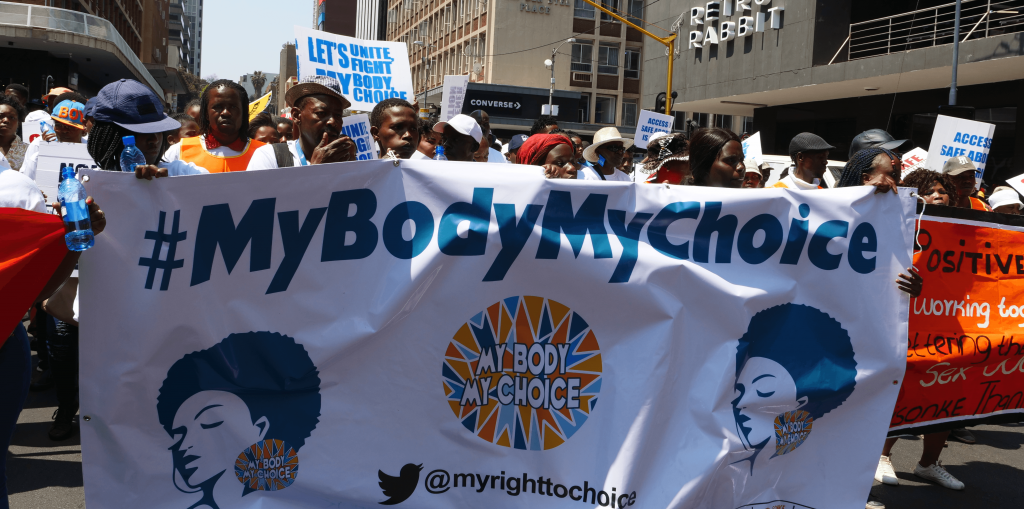This International Day of Action for Women’s Health we call on the South African government to put law into practice and ensure that all women have access to safe and legal abortion services.
Many states continue to control women’s bodies through criminalization of their sexual and reproductive conduct and decisions. The most recent example of this is the US State of Alabama, which just passed the strictest abortion law in the US, mandating a ban on abortion in almost all cases, including rape and incest.
We cannot talk about women’s rights without a focus on women’s sexual and reproductive rights, at the center of which is women’s agency to make choices about their own bodies, including if and when to have children.
In South Africa, abortion has been legal for over 20 years since the Choice on Termination of Pregnancy Act (CTOPA) was enacted in 1997, which gives pregnant people the right to have an abortion on request up until the 12th week of pregnancy, and with certain conditions before the 20th week. The right to reproductive healthcare is also made explicit in the South African Constitution.
According to the law, women can obtain abortions free of cost at public health facilities, and evidence shows that when performed by trained healthcare providers in sanitary conditions abortion is a very safe procedure.
Why is it then that despite our progressive legal framework, many women and girls – especially those in the poorest and most marginalised communities – continue to be injured and die from unsafe abortions in the country?
It starts with information. Studies and anecdotal evidence show that there is lack of knowledge among women and girls that they can access legal abortion services, which means they are more likely to seek unsafe abortions. Amnesty International recently learned from women in Amsterdam in Mpumalanga that no information is provided on abortion services in their clinic. And a search for ‘abortion’ and ‘termination of pregnancy’ on the National Department of Health website fails to bring up any advice or information. Yet flyers offering illegal abortion services are prolific on the internet and litter lampposts across the country.
The lack of information compounds stigma and myths about abortion, creating another barrier for women wanting to access abortion services. Amnesty spoke to women in Melmoth, KZN, some of whom wrongly believe that contraception causes abortion, and that all abortions will result in death. We heard from older women that a “ girl who could think of doing abortion is a cursed girl and is a dog”. Others in the group were sympathetic to the challenges adolescent girls experience with an unplanned pregnancy, and community youth groups are active in promoting access to sexual and reproductive health rights information.
Even if they have information, finding a health facility that provides abortion becomes the next obstacle. In Amsterdam,those seeking abortions have to travel 46 kms to the nearest hospital, which has one provider, resulting in long waiting times and the risk of being denied an abortion when the procedure is delayed beyond the gestational limits under the CTOPA. In 2016 the National Department of Health confirmed with Amnesty International that 505 of 3880 (13%) government health facilities were designated to provide abortion services, however only 264 (3,8%) were providing services. In 2017 Bhekisisa created the SizaMap, a data base on where to get a safe and legal abortion in South Africa.They consulted with provincial health departments and found that 246 facilities offered abortion, but of that only 236 could be reached by phone for verification and only 197 facilities confirmed that abortion services were provided.
Driving this disconnect is the unregulated refusal by healthcare professionals to provide abortion services – often termed “conscientious objection” – this obstruction of access contributes further to the shortage of health facilities providing this crucial service. Abortion providers play a vital role in protecting women’s health and rights, yet many face backlash and abuse from their colleagues, families and communities, with little to no support from their employer. One service provider we spoke to in Gauteng told us that she was the only provider in the clinic where she worked, and she was serving up to 40-60 patients a day, providing abortions to 30-50 patients a week. She believes her work is crucial to saving lives, but this situation is untenable and leads to burnout of abortion providers.
The government has a duty to ensure legal abortion services are available and must stop putting the health and lives of pregnant women and girls at unnecessary risk due to lack of adequate access to abortion services. They should alsoprioritise the prevention of unwanted pregnancy, through providing comprehensive sexuality education and modern contraception, including emergency contraception, and ensure that contraceptive stockouts are addressed urgently. In addition, they must issue clear guidelines and protocols, to healthcare professionals and facility management regarding regulation of “conscientious objection” and introduce related accountability mechanisms. Finally, they should increase access to medical termination of pregnancy services at primary health facilities and publicise accurate and accessible information about which health facilities provide first and second-trimester services.
This article was originally published by Daily Maverick .


